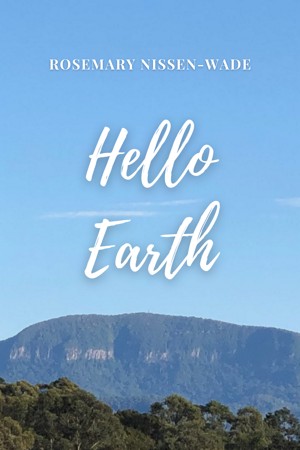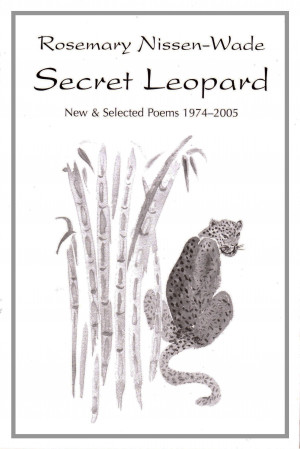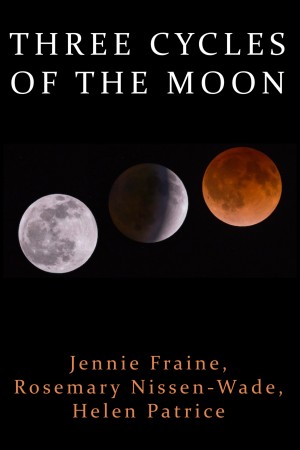Interview with Rosemary Nissen-Wade
Published 2023-06-17.
Where did you grow up, and how did this influence your writing?
I grew up on the island of Tasmania, in Launceston, which is now a city but was then a small town. It was nourishing for a child, full of scenic beauty – river, mountains, beautiful gardens... My dad was a keen gardener, and my whole extended family were environmentalists long before that label was even coined. Being so immersed in the natural world from so early an age means that it has been important in my life and my writing ever since. Poetry always seemed to me a natural response to beauty. (Then I realised it was a satisfying response to everything.)
What motivated you to become an indie author?
I'm a poet! Very few publishers will take on poetry. I have been published in paperback in the past (three books) but in those days I was also getting published in hard copy literary journals and anthologies, so there was that audience of potential buyers. For some years now I have embraced the online poetry world. I do still get invited to contribute to offline publications, and do, but my potential audience is now largely online.
I love reading ebooks myself, because they are so very portable, and one can adjust the print size etc., so it makes sense for me to publish my work in ebooks.
Also I am the best copy-editor I know. I am not impressed with the standard of editing by some of the online publishers that have sprung up, and I think their fees outrageous.
When did you first start writing?
I remember writing my first poem when I was seven, and in fact still have it. (It was a nature poem!) Once started, I never stopped. My Mum used to swear I was writing poems from the age of three. I was precocious in language, but I very much doubt I was WRITING them at three. If I made them up and others wrote them down, none have survived, and I don't remember. But I do remember the excitement of creating a poem when I was seven – setting out to do so, and realising I had succeeded – so I think that must really be when I began.
What's the story behind your latest book?
Jennie Fraine, Helen Patrice and I have been friends for decades – friendships formed originally through poetry, though they have grown to encompass much more. When someone formed a facebook group for people to write about their relationship with the moon every night for a month, we all embraced the idea. Being poets, we wrote our entries in verse. We so much liked what we all produced, that to collaborate in a book was a fairly obvious next step. (I think it was probably Helen who first suggested it, to the others' delighted agreement.) And so THREE CYCLES OF THE MOON was born. We all voted on all three sets of poems including our own, to make the final selection. Helen found us the perfect cover illustration, done by someone she knew. Helen and I had worked happily with ContentXDesign before, so asked them to do the book design and Smashwords formatting. We all love the result.
What is the greatest joy of writing for you?
It's hardly even a question of joy. (Joy is reading other people's writing – when it's good.)
Writing is the thing I can't not do, almost as essential as breathing and eating. Making a poem as good as I can is deeply satisfying, though. And I do find that making poems helps me with whatever I am dealing with in life. There is always something I can do in response to whatever it is, from the ecstatic to the dire.
I am driven, like most artists. This is my vocation. It does bring me joy at various times, in various ways – but that is actually irrelevant, lol.
What do your fans mean to you?
It's very encouraging to know that people like and are moved by my work. Online writing is good because you can get instant feedback. I appreciate the comments I get.
Sometimes fans become friends. I first met Helen Patrice, whom I mentioned earlier, because she wrote me a fan letter about one of my poems. That was in the days before blogs and social media, or even email, so it came via Australia Post. It was the only one I had ever received, so of course I wrote back to say thank you...
What my fans mean to me is that what I write is worthwhile, and it's OK to continue. I would continue anyhow – can't help myself, nor do I wish to – but it's better if it's not apparently going into some void.
What are you working on next?
A trilogy:
1) a memoir about conducting poetry workshops in a notorious prison, called 'Breaking Into Pentridge Prison: Memories of darkness and light.'
2) 'Blood from Stone,' a new edition of the prison poetry anthology which arose from those workshops.
3) 'Letters to a Dead Man,' a chapbook of my own poems, a spin-off from the memoir.
These are well into production and I hope to release them late in 2023.
They will be followed, hopefully in 2024, by the memoir which people have been requesting for years, about all the psychic/mystical/magical aspects of my life, tentatively titled 'Breaking Into the Great Beyond: the making of a psychic medium.' I have finally begun writing it. I had to write the prison memoir first, as the one leads to the other.
Hang on, what's this about magical and psychic aspects to your life? Can you say more about that?
Oh, um, well – I was psychic from early childhood, but I didn't know that's what it was. My parents told me it was my 'wonderful imagination', some other adults said I was telling lies, and other kids told me I was mad. So I soon suppressed it – very hard. By the time I was in my forties it wouldn't stay suppressed any more, and the resurgence was accompanied by some not-so-coincidental contact with practitioners of magic. Skating over a lot of detail and many years – I am now a witch, a professional healer (particularly via Reiki) and a professional psychic medium.
What inspires you to get out of bed each day?
My cat's empty belly – and then my own.
When you're not writing, how do you spend your time?
I am now semi-retired, and have been widowed since September 2012. I live alone except for my cat, and have adjusted to it. I have always been rather introverted and solitary anyway. So I spend my time doing pretty much as I please. Most of my time is spent writing, or doing related things (such as administering various online poetry groups, and writing regular articles about poetry for a community of blogging poets). But when I'm not –
I read books, lots and lots of books. I have a pathological fear of running out of reading matter, so I buy far more books and ebooks than I could finish in the average lifespan. But I plan to live long! I also enjoy re-reading my favourites.
I watch movies and TV shows (not all that many, just the ones I consider splendid and wonderful).
I swim in the local hydrotherapy pool. (Brought up swimming in still water – rivers, creeks, lakes, dams – I'm scared of waves so I don't swim in the ocean.) I go for walks in nature, including ocean beaches.
I spend time in my garden (doing minimum gardening, just enjoying). I spend time with my cat, either playing or just hanging out.
I socialise with friends, usually over coffee or lunch in town, or seeing a movie together.
I belong to a women's circle called The Goddesses of Shining Light – beautiful women of various ages and spiritual paths, who unite in valuing the female aspects of the Divine, sharing our wisdom with each other, and hopefully contributing Light to our community. We meet monthly, celebrate Solstices and Equinoxes, dance, meditate, research topics of interest....
I also do solitary witchy things.
I like taking photos, and if necessary editing them to be more beautiful and interesting. I belong to a facebook photography group.
Sometimes I try to sketch, mainly with water-colours now, though in earlier years I used chalk pastels.
Occasionally I do a bit of guilty housework.
How do you discover the ebooks you read?
Usually I find out about a book I think I want to read, then search for the ebook version.
What is your writing process?
Open iPad, click on Pages (an app I put on it), start.
(Occasionally I do use paper and pen, if circumstances so dictate. But very seldom any more.)
I often write to prompts, or I practise particular forms. I also like to look around and be inspired by the natural world, or even some object/s in my home.
If I am really stuck, I turn to the exercises in either of my favourite books for poets: WINGBEATS, ed. Scott Wiggerman and David Meischen, and THE CRAFTY POET ed. Diane Lockward (both now with a Volume 2 out, which I have as well). The beauty of these is that one can return again and again, even to the same chapters, and be recharged. (For more general re-inspiration, I always come back to Natalie Goldberg's WRITING DOWN THE BONES and WILD MIND.)
I tend to do most of my revisions right then, at the point of first composition, so I have something which may well be finished before I post it on my blog. I also value the practice of putting a poem away for a long time and then looking at it to see what more it may need. So I tell blog readers that everything there is potentially still a draft, open to alteration without notice (and that does happen).
I believe in saying one's poems aloud to oneself before letting them loose in the world. The ear in the mind is just not good enough.
I like to write every day, or nearly every day.
What are your five favorite books, and why?
THE LITTLE PRINCE by Antoine de Saint-Exupéry
THE LITTLE WHITE HORSE by Elizabeth Goudge
THE ALCHEMIST by Paulo Coelho
THE COLLECTED POEMS W. B. Yeats
COLLECTED POEMS Michael Dransfield
The first three are gentle and mystical.
The other two are my very favourite poets.
They are all listed here because when I looked to see, these came first to mind and have stood the test of time. I would probably always put THE LITTLE PRINCE first; it has great sentimental and symbolic meaning for me. But ask me another time, I might choose a different four to accompany it – there are so many books I love.
What are your three favourite poems?
What, only three?
Well, OK, I come back to these again and again, with no diminution of delight. Each of them gives me a deep satisfaction.
It’s interesting to note the sadness of the subject matter! But it’s not that which so moves me; it’s the sheer beauty of the language (which perhaps the subject matter calls forth) and indeed the perfection, in these works, of every aspect of the poet’s craft.
Last Words by Sylvia Plath
http://poetryblogroll.blogspot.com.au/2013/01/i-wish-id-written-this.html
Patricia’s Raga by Michael Dransfield
http://www.poetrylibrary.edu.au/poets/dransfield-michael/patricia-s-raga-make-the-mind-an-astrolabe-0712040
The Company of Lovers by Judith Wright
https://allpoetry.com/The-Company-Of-Lovers
If you know anything of my life, you might assume the subject matter is cathartic for me, now that I have experienced widowhood and other losses. But I have loved these poems for decades: the Wright since my teens, the others since I was a young woman.
I’m pleased to observe that my list of three includes two Australians, and two women. I’m a little surprised to note that, when it came right down to it, it didn’t include anything by W B Yeats or the American Jared Carter; they certainly would have got into a list only slightly longer.
I thought I would have to do a lot of thinking, as there are many poems I love deeply and faithfully, but after all I realised quickly that these are the ones, and in this order. The only reason to think about it at all was that I had never considered this question before.
Perhaps I’ll encounter other poems eventually which will supplant these, but it seems unlikely …. oh no no, what am I saying? How could I forget In My Craft or Sullen Art by Dylan Thomas?
http://poetryblogroll.blogspot.com.au/2012/09/i-wish-id-written-this_21.html
I’ll have to make it a list of four; can’t leave that one out. I’d better stop thinking right now, or there will be more!
(Two of the links provided for these poems are to articles I've written about them for the Poets United community – which just goes to show how highly I rate them.)
What advice would you give to new / young poets just starting out?
Probably little new; mostly the same advice I have received myself. But it can bear repeating.
So, passing on tips I’ve been given:
1. Keep writing. We learn by doing.
2. Keep reading the best poetry you can find. We learn that way, too.
3. It’s OK to write really rotten poems. Give yourself permission. We also learn from our failures. (When you go over the edge, you find out where the edge is.)
4. Study the craft. Even free verse is not haphazard. It’s fine to break the rules (it may be wonderful) but you need to know them well in order to break them successfully.
5. Make the pauses where the breath would naturally pause if you were speaking it.
6. Always read a new poem aloud to yourself before you decide it’s as good as you can get it.
7. Beware of adjectives and adverbs; use VERY sparingly. They weaken the impact.
And some I arrived at for myself:
8. Listen to every piece of criticism you ever get. It will tell you where the poem is not working for that person, and possibly for others. Unless it’s another poet, whose work you admire, you can thank them politely for any advice about how to fix the problem, and proceed to ignore that. You just need to know the problem is there; you’re the best judge of how to address it.
9. It’s true that nothing is ever really finished, just abandoned. But don't revise the life out of things; you can lose the original zest in the quest for perfection.
10, Poetry – like all art – is play. Try not to lose that. If you get too deep and meaningful, you’re liable to dry up. Don't turn your joy into a chore.
11. Read WRITING DOWN THE BONES and WILD MIND by Natalie Goldberg, and do what she says.
Smashwords Interviews are created by the profiled author or publisher.
Books by This Author
The Book of I Like
by Rosemary Nissen-Wade
When Rosemary donned her purple Goddess gown and took her poetry to Texas, she met a kindred spirit who showed her how to relish her life: the personal and the shared, the quirky and the everyday. Let this little book of unique prose-poetry demonstrate it to you too!
Secret Leopard: New and Selected Poems 1974-2005
by Rosemary Nissen-Wade
“Rosemary Nissen-Wade is both original and a powerful voice—a voice of humanity in all its suffering and joy”, says the publisher’s Preface to the original paperback edition. This is the long-awaited digital re-issue of poems from Rosemary’s days as an acclaimed performance poet also widely published in hard copy books, journals and anthologies.
Three Cycles of the Moon
by Rosemary Nissen-Wade, Jennie Fraine, & Helen Patrice
Three Cycles of the Moon is a collection of poetry by Helen Patrice, Rosemary Nissen-Wade, and Jennie Fraine. The poems were written over a month, and all to do with some aspect of or relationship to the Moon. As they move through the lunar month, their thoughts, inspirations, and responses move with them. Patrice was travelling for part of the month, Nissen-Wade, and Fraine moored in Australia.




